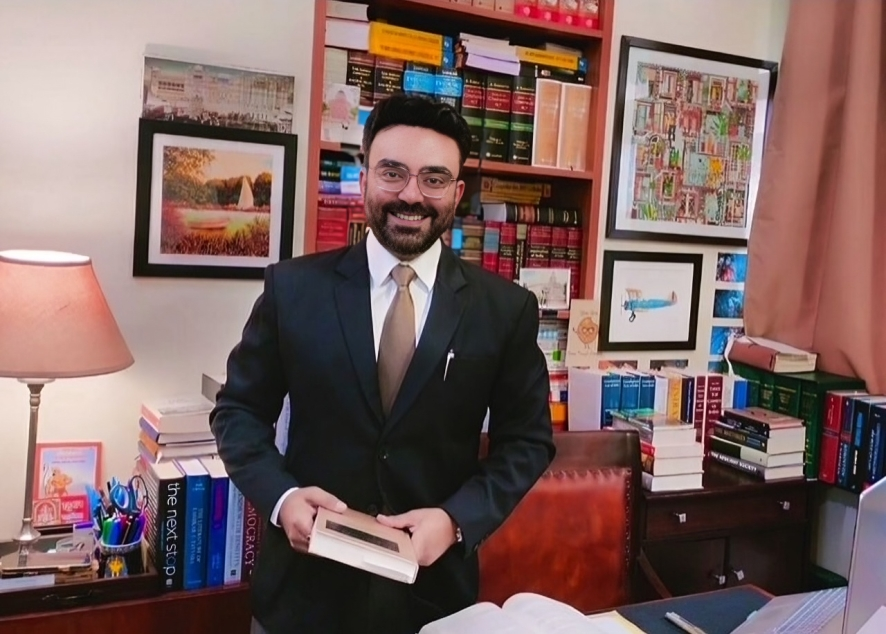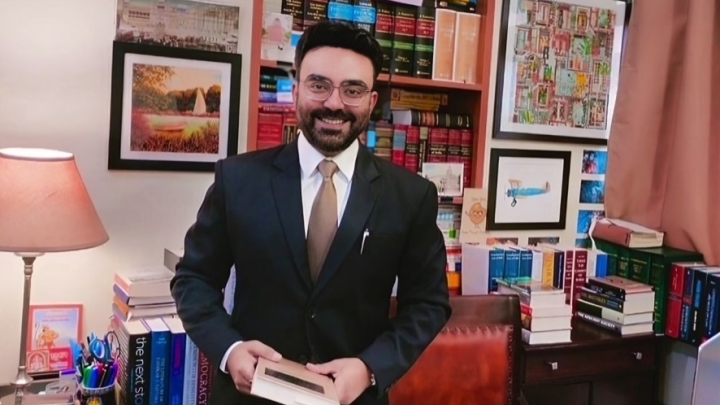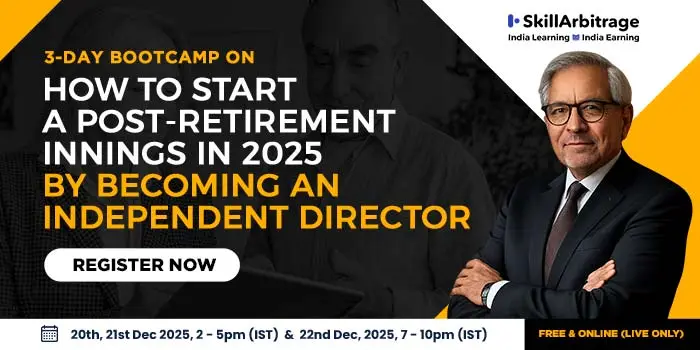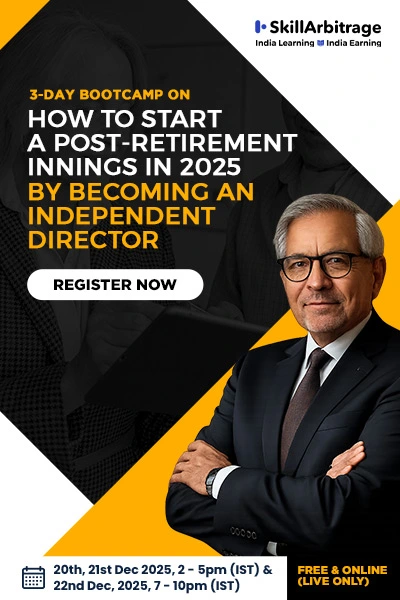Founder
34098
0
0
“If you enjoy the law, keep your head down and work when times get tough, respect your seniors, there are enough reasons to pursue your journey.” – Udayan Verma, Independent Legal Practitioner.
This interview was taken by SuperLawyer Team
Posted on June 14, 2025
This interview has been published by Anshi Mudgal and The SuperLawyer Team

You’ve built a distinguished independent practice, representing both high-stakes private clients and government enterprises. What inspired your transition from being an Associate under a Senior Advocate to establish your own practice?
Thank you very much. As much as I appreciate the kind gesture, I feel it is too soon to say that I have a distinguished practice. I am definitely humbled and grateful by the opportunities that have come my way; there is still a lot of learning left and I hope to achieve more at the right time.
While practicing law, as one matures and learns to grasp how the legal industry operates in India, one reaches a stage where there is a simultaneous urge to make your own mark in the profession. One’s personal aspirations coupled with the rigorous training which is undertaken during the initial years of practice leads one to desire more from their capabilities as a lawyer. You get down to brass tacks, work on your thought-process and make an honest attempt at handling a legal brief sans supervision. In the process, you wish to hold your own turf, work with the tools which you have gathered, seek client(s) and navigate the case accordingly. You also become accountable and feel ready to take the flak when things don’t go as per expectations. In essence, this feeling is very subjective and the inflection point cannot be attributed to a single event.
To answer your query, I feel ‘inspiration’ is not a linear term. It can come from the mundane to the magnificent moments of your personal and professional endeavours. They are building blocks of your personality which end up getting chronicled in the vicissitudes of life. In my case, there have been various instances which have inspired me to cut the cord and carry my own weight. Growing up in New Delhi one has an early exposure to the power corridors and legal circles of India. One of the earliest exposures which I can recollect is watching parliamentary debates and reading interviews of many senior lawyers and distinguished legal luminaries. This was a constant source of inspiration during my formative years. A chance-meet with some of the prominent figures in the legal world was also a source of encouragement to consider joining the profession.
While these are contributory factors, I owe substantial credit to my Senior Mr. Prashanto C. Sen, Sr. Advocate who, being a first-generation lawyer, has established a flourishing litigation practice in India. His noble approach to the profession, impeccable standards and going the extra mile to serve the legal needs of his clientele inspired me the most. While taking me under his wings, he not only taught me the fundamentals of law; his training and invaluable wisdom which I imbibed, helped me come out of my shell at an early stage of my litigation career and further encouraged me to start my own practice.
Your practice spans infrastructure, mining, energy, and arbitration sectors known for their complexity and regulatory intensity. What drew you to these domains, and how did your early exposure during internships and associate years influence this path?
Yes, my practice till now has ended up within the four corners of these domains that you have mentioned. Just to give you a brief overview, after graduating in B.A. (Hons.) from the University of Delhi where I read Economics, I pursued the three-year LL.B. course at Campus Law Centre, Faculty of Law, University of Delhi. While attending law school, I used to be drawn towards understanding the dynamics of laws and regulations which are applicable while conducting business activities and commercial dealings. This was probably because of my background in Economics which is a commercially – oriented field.
With time I was clear that I would like to gain further knowledge and deeper insights into commercial laws which are applied in business affairs. My interests and curiosity piqued during Company Law classes at CLC, and I wanted to further analyse how these laws end up navigating businesses in the real world. In order to see whether I fit into these domains, apart from general reading at law school, I simultaneously undertook multiple legal internships at some of the most prestigious law firms as well as the Attorney General of India’s office. My internship days taught me the basics of not just corporate law practice but also how to conduct oneself in law firms. Although as interns we had limited roles, it was during these rigorous training sessions that I got the initial exposure to these domains. At corporate law firms, I was able to understand how lawyers apply the law on a day-to-day basis to help corporations and other businesses solve complex legal issues in these sectors. I was fortunate to intern under some of the best legal minds in the country, many of whom showed excellent qualities of being a lawyer and were very patient with the younger lot.
When I decided to pursue a career in litigation, Commercial Litigation and Disputes Resolution came as a natural choice since it includes a mix of both – appearing before judicial forums and practicing commercial laws. It also includes within its fold advisory, ADR and counsel work. I chose counsel-chamber practice since there is more responsibility which is put on your shoulders thereby shortening the learning curve. In chamber practice, you are directly dealing with clients while single handedly assisting your Senior.
Importantly, Mining, energy and other areas of the infrastructure sector are highly regulated and routinely end up being exposed to major and complex litigations against the State. They require consistent consultations with counsels, legal experts and sectoral specialists. I was lucky to be selected at the Chambers of Mr. Prashanto Sen, SA to start my legal career. It was during my initial days as an Associate where I got a proper exposure to these domains. During my term as an Associate, I was tasked with handling very high stakes litigations for not just infrastructure MNCs but also government/PSU bodies as well as sector-Regulators such as CCI and AERA. This was a golden opportunity since one got to analyse issues from both ends of the spectrum – as a private entity as well as a public body. We were tasked with counsel work in diverse fields of law and I was taking care of briefs concerning three major sectors: mining, electricity and aviation. I was therefore very fortunate to get the right exposure in these fields at an early stage of my litigation career, and perhaps this was the inflection point since the exposure helped me shape my domain knowledge, and provided the required impetus to refine my legal craft.
Representing clients in high-stakes disputes involves navigating regulatory and commercial pressures. Could you share a particularly challenging or defining case and how was your experience dealing with it?
That is correct, it is a high-pressure area of practice. Room for error is minimal. The stakes are very high and the timelines equally rigid.
Till date, one of the most challenging and defining cases as an Independent Counsel has been C.A. No. 262/2020 (titled Vedanta Ltd. v. R.N. Mohapatra and Ors.) where I was engaged before the High Court in writ proceedings as well as the Supreme Court. The case involved various complex and interesting legal issue(s) concerning Constitutional Law, Contracts, Customs and Trade Law, Civil Contempt Jurisprudence. This litigation spanned over a period of close to 3 years and was one of my very first legal brief(s) as a newly-minted independent Counsel. It was during the course of this litigation that I ended up building great rapport with many able lawyers – both in-house and outside Counsels and commercial-management specialists with whom I still share a working relationship. I was also fortunate to have been guided by Senior in-house counsels and industry leaders, who were very kind to acknowledge my efforts and support me further in my practice.
I would say that handling high stakes disputes help you come out of your comfort zone as a lawyer. The experience(s) ends up educating you on the ground realities of how academic knowledge is to be applied whilst handling a matter, to the benefit of the client whose business interests are at stake and who is relying on your capabilities to assist them.
These opportunities don’t knock on your doors very often; therefore, it is imperative that you take up such cases without any hesitation. You can always learn along the way. While handling these disputes one faces a lot of challenges – both professionally and personally – which end up testing your mettle. These cases are laborious and demand long hours which at times run into late nights and early mornings, working on weekends, gruelling schedules and exhausting deadlines, all while micromanaging immense pressure from the client. However, when you come out on the other end, you will always be satisfied irrespective of the outcome of the case and be glad that you pushed through.
Having advised both government enterprises and Fortune 500 companies, what key differences have you observed in their legal cultures, decision-making processes, and approaches to risk?
In my limited experience, I would say that the legal culture per se is not very distinguishable. At the end of the day both sets of corporations engage lawyers who play a very specific role. Lawyers have their tasks cut out and are only performing their duties as per the terms of engagement/Vakalat.
While it is true that private and public corporations have their distinct characteristics and cultures, both do have their sector-specific targets and goals which are required to be fulfilled at all times. The legal team(s) of both are answerable to the management’s needs. Thus, at a macro level and from the outside one does not feel that there is much difference in the day-to-day operations and engagements.
I cannot comment much on the decision-making process of either of the two, but I would say that there is a certain level of risk-taking appetite, which is much higher in private corporations as compared to government enterprises. This is borne out of various factors: Private corporations are Laser-focused on profitable outcomes of their decisions with minimal externalities. The time lines are very strict and there is little to no room for any ambiguity. The targets and management/commercial asks are very clearly classified and is percolated through a chain of command. As a corollary, the expectations from an outside Counsel also becomes crystal clear. Private corporations are democratic in that there is much more room to express creative ideas, out-of-the-box thinking is encouraged during conferences and at times appreciated. Frankly, one sees a very peculiar pattern where, due to the fact that private organisations encourage quick and bold decision-making efforts, the unnecessary clutter and irrelevant thought process are weeded out at the very initial stages of brainstorming, helping the team to clearly demarcate the tasks at hand and focus on the relevant issues.
On the other hand, PSEs work in a more conservative fashion but are professional in their conduct. There are already established norms and set patterns/traditions which are adhered to and followed while performing the tasks at these organisations. I would say that the propensity-appetite to take risks in PSEs are much lower and there is a consistent effort to avert exposure to untoward outcomes. Being a government company which is answerable to the state exchequer and other departments, a PSE always has a touch of public duty in their actions which ends up contributing to the behaviour of not being very intrepid. This factor is ingrained in the functioning of many PSEs and is reflected while handing litigations and taking decisions. PSEs do command a lot of admiration and respect for the work which they are doing in the infrastructure domain – they are very clear on their roles and the primary objective of building the nation. In that pursuit, many are working tirelessly to achieve this goal.
You initially studied economics before pursuing law. What led you to choose a career in law, and how has your academic grounding in economics complemented your legal work?
This is a very interesting question. I will say that an error of judgment led me into reading economics which then led me to law. It was during my first year of graduation at Sri Venkateswara College (University of Delhi) where I read taxation and basics of Public Economics. I had an epiphany and I started reading more basics of law which was available in the University library. This made me realise that law was my actual calling throughout. Since I did not want to let go of the opportunity of pursuing a coveted course such as Economics from DU, I decided to sit tight and then pursue the three-year LL.B. course offered by the Faculty of Law, University of Delhi.
Although Economics and Law only converge in certain specific legal fields such as Competition/Anti-Trust, Aviation, etc., in my personal opinion I feel Economics helped me to a great extent in shaping my commercial analyses of legal issues. B.A. (H) Economics is rigorous and is a highly analytical course rooted in problem solving capabilities. Further, commercial clients need a result-oriented approach to a dispute. The grounding in economics certainly complemented my legal work and till date helps me understand business-commercial needs in a better fashion.
For young litigators looking to build a niche in infrastructure or regulatory disputes, what skills and experiences should they focus on early in their careers?
For young litigators my advice is to undertake a lot of drafting work during the initial years of their career. Drafting is like solving mathematical equations – the more you do it the more skilled you become. Secondly, stay up to date with what’s happening around the world – read at least 2 national dailies. It is very important that your client believes that their lawyer is not living under a rock! Thirdly, you need to know which laws and bare acts to look into whilst dealing with a client query – while no one expects you to verbatim learn the statutes, it is expected that you can figure out the applicable laws on the issues. This comes with practice and it is important that you keep revising the bare acts occasionally/during vacations. Fourthly, it is a harsh suggestion but in order to survive in litigation you cannot look at the clock till you finish a task – infrastructure and regulatory sector is a very demanding branch with gruelling working hours. Just like building muscles during strength training, you need to build stamina to brave the requirements in independent practice. The longer hours you pull during your initial days will make or break your practice in the subsequent years. So be ready to give it your all. Lastly, and most importantly no matter how much pressure is put on you or how powerful your clientele is, never compromise on your ethics and integrity. Go to bed with a clean conscience. As Advocates, the Standards of Professional Conduct and Etiquette under the Advocates Act, 1961 is our Holy Scripture. As Officers of the Court, it is our solemn duty to uphold the Code’s sanctity. Make sure your professional standards don’t drop by any margin whatsoever.
What’s one core principle or motto that has guided your legal journey? How do you envision the growth of your practice and your role in the evolving legal landscape of India?
There is a Latin phrase ‘Incende naves’ which means burn the ships. It isn’t about ships, it is about committing oneself to a belief, and striving towards achieving your goals and endeavours to the best of your abilities without looking back. This core principle has guided my legal journey from the day I stepped into law school. Legal practice (of any nature – litigation/corporate) is a complicated voyage riddled with uncertainties and externalities. I believe in order to survive in litigation you need this core principle ingrained in you at a very initial stage of life. If you enjoy the law, keep your head down and work when times get tough, respect your seniors, there are enough reasons to pursue your journey.
To answer your other question, I feel litigation and disputes practice is here to stay notwithstanding the onset of the Artificial Intelligence revolution across fields. Law is a distinct arena where no matter how much technology one infuses, one will always need the reassurance of a legal mind and a human touch. The legal landscape of India is definitely undergoing successive churns; this is part and parcel of a growing economy. I am looking forward to seeing more ADR mechanisms being put in place. I see a significant growth in arbitration as well as mediation sectors in the next couple of years. While my practice is already within the core litigation space, I do envision to move more and more into the arbitration and other ADR practice. There is a lot of work to be done in these fields.
With a practice that spans high-stakes matters and sectoral expertise, how do you maintain personal balance, and what keeps you intellectually and professionally motivated in the long run?
In independent practice, how you manage your time is mostly up to you. It is important to have a daily routine and more important to stick to it. In my case, there are days when you don’t get time to even sit for a minute, but then there are days which are fairly light. So, I balance it out. On lighter days I do strength training, read a lot of non-fiction books (especially on current affairs, economics, etc.), and occasionally travel with family.
In the long run, the only thing which motivates you is your passion for law, helping people in need, and knowing that you are now part of a very illustrious and prestigious community, be it litigation or transactional practice. There is fairly no other stream of motivation because your career is not a straight steam-lined path. In order to find more motivation, it is important that you go to courts even on days when you don’t have a matter listed, sit and observe the judges as well as the seniors who are arguing a case, stay up to date on any important judgments and maintain very healthy professional boundaries between your practice and your clientele.
Get in touch with Udayan Verma –







No comments yet
Be the first to share your thoughts about this interview.